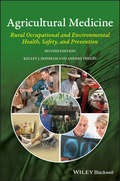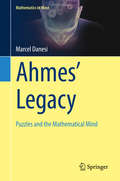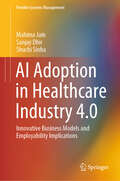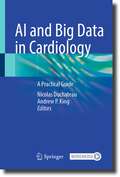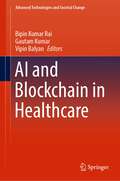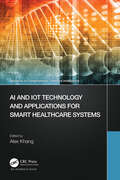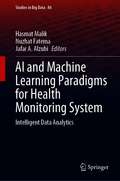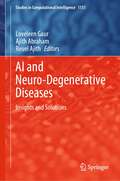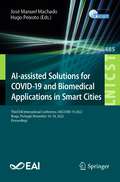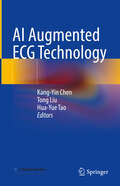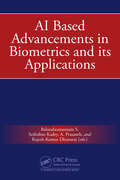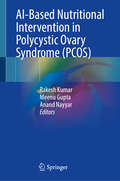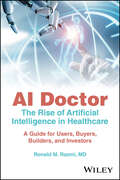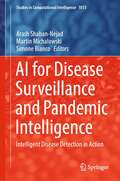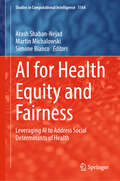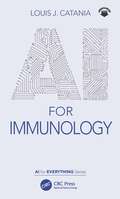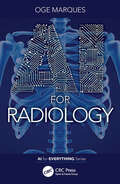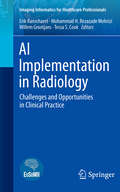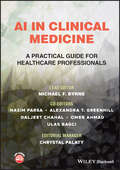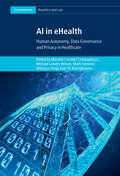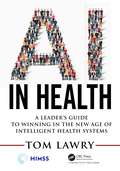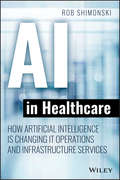- Table View
- List View
Agricultural Biotechnology in Sub-Saharan Africa: Capacity, Enabling Environment and Applications in Crops, Livestock, Forestry and Aquaculture
by John Edward Otieno Rege Keith SonesThis book offers a comprehensive analysis of the application level for various agricultural biotechnologies across Sub-Saharan Africa. The authors examine the capacity available as well as the enabling environment, including policy and investments, for facilitating agricultural biotechnology development and use in the region. For each Sub-Saharan country, the status of biotechnology application is assessed in four major sectors; Crops, Livestock, Forestry and Aquaculture. Examples such as the number and requisite skill levels of trained personnel, biosafety frameworks and public awareness are surfaced in these chapters. This work also discusses the impact of push-pull factors on research, training and food security and identifies opportunities for investment in biotechnology and local agribusiness.Development partners, policy makers, agricultural consultants as well as scientists and private sector investors with an interest in biotechnology initiatives in Sub-Saharan Africa will find this collection an important account to identify key gaps in capacity and policy, as well as priority areas going forward. The volume highlights ways to develop technology and increase agricultural production capacity through international cooperation and inclusive economic growth, making it a valuable practice guide in line with the UN Sustainable Development Goals, in particular SDG 2 Zero Hunger and SDG 8 Decent Work and Economic Growth. Clear case studies round off the reading experience.
Agricultural Medicine: Rural Occupational and Environmental Health, Safety, and Prevention
by Kelley J. Donham Anders ThelinNewly updated, Agricultural Medicine: Rural Occupational Health, Safety, and Prevention, Second Editionis a groundbreaking and comprehensive textbook and reference for students and practitioners of public health, and professionals in the field of rural agricultural occupational health and safety. The book introduces specific occupational and environmental health and safety issues faced by agricultural workers and rural residents, and provides a roadmap to establishing sustainable worker and public health support in agricultural communities. Responding to reader demand, Agricultural Medicine, Second Edition now features more case studies, key point summaries, and new international perspective chapters comparing North American health and agricultural practices to those in Europe, the Asia Pacific, and South America. Agricultural health and safety engages a multidisciplinary team of medical professionals, veterinarians, safety professionals, engineers, sociologists, epidemiologists, and psychologists, for whom this book serves as an essential resource.
Agro-Technology
by R. Paul ThompsonHumans have been modifying plants and animals for millennia. The dawn of molecular genetics, however, has kindled intense public scrutiny and controversy. Crops, and the food products which include them, have dominated molecular modification in agriculture. Organisations have made unsubstantiated claims and scare mongering is common. In this textbook Paul Thompson presents a clear account of the significant issues - identifying harms and benefits, analysing and managing risk - which lie beneath the cacophony of public controversy. His comprehensive analysis looks especially at genetically modified organisms, and includes an explanation of the scientific background, an analysis of ideological objections, a discussion of legal and ethical concerns, a suggested alternative - organic agriculture - and an examination of the controversy's impact on sub-Saharan African countries. His book will be of interest to students and other readers in philosophy, biology, biotechnology and public policy.
Agrobacterium Biology: From Basic Science to Biotechnology (Current Topics in Microbiology and Immunology #418)
by Stanton B. GelvinThis volume reviews various facets of Agrobacterium biology, from modern aspects of taxonomy and bacterial ecology to pathogenesis, bacterial cell biology, plant and fungal transformation, natural transgenics, and biotechnology. Agrobacterium-mediated transformation is the most extensively utilized platform for generating transgenic plants, but modern biotechnology applications derive from more than 40 years of intensive basic scientific research. Many of the biological principles established by this research have served as models for other bacteria, including human and animal pathogens. Written by leading experts and highlighting recent advances, this volume serves both as an introduction to Agrobacterium biology for students as well as a more comprehensive text for research scientists.
Ahmes’ Legacy: Puzzles And The Mathematical Mind (Mathematics in Mind)
by Marcel DanesiThis book looks at classic puzzles from the perspective of their structures and what they tell us about the brain. It uses the work on the neuroscience of mathematics from Dehaene, Butterworth, Lakoff, Núñez, and many others as a lens to understand the ways in which puzzles reflect imaginative processes blended with rational ones. The book is not about recreational or puzzle-based mathematics in and of itself but rather about what the classic puzzles tell us about the mathematical imagination and its impact on the discipline. It delves into the history of classic math puzzles, deconstructing their raison d’être and describing their psychological features, so that their nature can be fleshed out in order to help understand the mathematical mind.This volume is the first monographic treatment of the psychological nature of puzzles in mathematics. With its user-friendly technical level of discussion, it is of interest to both general readers and those who engage in the disciplines of mathematics, psychology, neuroscience, and/or anthropology. It is also ideal as a textbook source for courses in recreational mathematics, or as reference material in introductory college math courses.
AI Adoption in Healthcare Industry 4.0: Innovative Business Models and Employability Implications (Flexible Systems Management)
by Sanjay Dhir Shuchi Sinha Mahima JainThis book focuses on the prominent innovative business models and employability implications of artificial intelligence in the healthcare industry 4.0. To do so, it draws upon a rich base of case studies from robotics, virtual assistants, precision medicine, etc., to highlight the possibilities and implications of AI on health care. The book is useful in a variety of ways to the different stakeholders of healthcare sector. It helps medical professionals to understand the impact of the present technologies being adopted and the potential of AI-based technology. The content is of use for the policy makers as it also highlights the managerial and research implications, challenges, opportunities posed by the adoption of AI in healthcare industry 4.0. The rich case study analysis in the area of adoption of AI in healthcare helps generate insights for the academicians and researchers of this field in terms of the parallels drawn between adoptions of AI in healthcare industry 4.0 across the world. It is also useful for management students to understand the key management perspective when healthcare organizations attempt to devise strategies/policies for adoption of AI-driven technologies and processes implementation.
AI and Big Data in Cardiology: A Practical Guide
by Nicolas Duchateau Andrew P. KingThis book provides a detailed technical overview of the use and applications of artificial intelligence (AI), machine learning and big data in cardiology. Recent technological advancements in these fields mean that there is significant gain to be had in applying these methodologies into day-to-day clinical practice. Chapters feature detailed technical reviews and highlight key current challenges and limitations, along with the available techniques to address them for each topic covered. Sample data sets are also included to provide hands-on tutorials for readers using Python-based Jupyter notebooks, and are based upon real-world examples to ensure the reader can develop their confidence in applying these techniques to solve everyday clinical problems.Artificial Intelligence and Big Data in Cardiology systematically describes and technically reviews the latest applications of AI and big data within cardiology. It is ideal for use by the trainee and practicing cardiologist and informatician seeking an up-to-date resource on the topic with which to aid them in developing a thorough understanding of both basic concepts and recent advances in the field.
AI and Blockchain in Healthcare (Advanced Technologies and Societal Change)
by Bipin Kumar Rai Gautam Kumar Vipin BalyanThis book presents state-of-the-art blockchain and AI advances in health care. Healthcare service is increasingly creating the scope for blockchain and AI applications to enter the biomedical and healthcare world. Today, blockchain, AI, ML, and deep learning are affecting every domain. Through its cutting-edge applications, AI and ML are helping transform the healthcare industry for the better. Blockchain is a decentralization communication platform that has the potential to decentralize the way we store data and manage information. Blockchain technology has potential to reduce the role of middleman, one of the most important regulatory actors in our society. Transactions are simultaneously secure and trustworthy due to the use of cryptographic principles. In recent years, blockchain technology has become very trendy and has penetrated different domains, mostly due to the popularity of cryptocurrencies. One field where blockchain technology has tremendous potential is health care, due to the need for a more patient-centric approach in healthcare systems to connect disparate systems and to increase the accuracy of electronic healthcare records (EHRs).
AI and IoT Technology and Applications for Smart Healthcare Systems (Advances in Computational Collective Intelligence)
by Alex KhangIn recent years, the application of Artificial Intelligence (AI) and Internet of Things (IoT) technologies in smart healthcare has been increasing. We are approaching a world where connected smart devices tell people when they need to visit a doctor because these devices will be able to detect health problems and discover symptoms of illness that may need medical care. AI-collaborative IoT technologies can help medical professionals with decision-making. These technologies can also help develop a sustainable and smart healthcare system.AI and IoT Technology and Applications for Smart Healthcare Systems helps readers understand complex scientific topics in a simple and accessible way. It introduces the world of AI-collaborative IoT physics, explaining how this technology behaves at the smallest level and how this can revolutionize healthcare. The book shows how IoT technology and AI can work together to make computers more powerful and capable of solving complex problems in the healthcare sector. Exploring the effect of AI-collaborative technology on IoT technologies, the book discusses how IoT can benefit from AI algorithms to enable machines to learn, make decisions, and process information more efficiently. Because smart machines create more perceptive devices and systems, the application of this technology raises important ethical questions about privacy, security, and the responsible development of healthcare IoT technology, which this book covers. The book also provides insight into the potential applications of these technologies not only in the healthcare industry but also in related fields, such as smart transportation, smart manufacturing, and smart cities.
AI and Machine Learning Paradigms for Health Monitoring System: Intelligent Data Analytics (Studies in Big Data #86)
by Hasmat Malik Nuzhat Fatema Jafar A. AlzubiThis book embodies principles and applications of advanced soft computing approaches in engineering, healthcare and allied domains directed toward the researchers aspiring to learn and apply intelligent data analytics techniques. The first part covers AI, machine learning and data analytics tools and techniques and their applications to the class of several hospital and health real-life problems. In the later part, the applications of AI, ML and data analytics shall be covered over the wide variety of applications in hospital, health, engineering and/or applied sciences such as the clinical services, medical image analysis, management support, quality analysis, bioinformatics, device analysis and operations. The book presents knowledge of experts in the form of chapters with the objective to introduce the theme of intelligent data analytics and discusses associated theoretical applications. At last, it presents simulation codes for the problems included in the book for better understanding for beginners.
AI and Neuro-Degenerative Diseases: Insights and Solutions (Studies in Computational Intelligence #1131)
by Loveleen Gaur Ajith Abraham Reuel AjithThis book explores the current state of healthcare practice and provides a roadmap for harnessing artificial intelligence (AI) and other modern cognitive technologies for neurogenerative diseases. The main goal of this book is to look at how these techniques can be used to classify patients with neurodegenerative diseases by extracting data from multiple modalities. It demonstrates that the growing development of computer-aided diagnosis systems has a lot of potential to help with the diagnostic process. It offers an analysis of the prospective and perils in implementing such state of the art.Progressive brain disorders with a high prevalence in the general population include Parkinson's disease, Alzheimer's disease and other types of dementia, Huntington's disease, and motor neuron disease. Worldwide, it is estimated that 33 million people have Alzheimer's disease, and 10 million people have Parkinson's disease. The global health economy is significantly impacted by these disorders, which affect both the patient and the caregivers. Various diagnostic techniques are used for differential diagnoses, such as brain imaging, EEG analysis, molecular analysis, and cognitive, psychological, and physical examination. The book aims to develop effective treatments, enhance patient quality of life, and extend life expectancy. It focuses on novel artificial intelligence approaches to clarify the pathogenesis of neurodegenerative disorders and provide early diagnosis.The authors compile recent developments based on machine learning and deep learning techniques to diagnose neurodegenerative diseases using imaging, genetic, and clinical data. The authors support initiatives and methods that aim to improve the application of algorithms in diagnostic practice.
AI-assisted Solutions for COVID-19 and Biomedical Applications in Smart Cities: Third EAI International Conference, AISCOVID-19 2022, Braga, Portugal, November 16-18, 2022, Proceedings (Lecture Notes of the Institute for Computer Sciences, Social Informatics and Telecommunications Engineering #485)
by José Manuel Machado Hugo PeixotoThis book constitutes the refereed post-conference proceedings of the Third International Conference on AI-assisted Solutions for COVID-19 and Biometrical Applications in Smart Cities, AISCOVID-19 2022, held in November 2022 in Braga, Portugal. The 8 full papers of AISCOVID-19 2022 were carefully selected from 21 submissions and present a comprehensive and up-to-date look at the intersection of COVID-19, big data, machine learning, deep learning, and healthcare. The theme of AISCOVID-19 2022 was Healthcare effective and efficient Solutions for COVID-19 that can be achieved using Artificial Intelligence and Computer-Assisted paradigms.
AI Augmented ECG Technology
by Kang-Yin Chen Tong Liu Hua-Yue TaoThis book mainly focuses on the application of AI technology in the field of ECG, and details the theoretical, practical, and evidence-based aspects of this technology. It extensively reviews the latest research reports, and discusses the application of artificial intelligence in the diagnosis and treatment of cardiovascular diseases. This book focuses on the application of artificial intelligence in the diagnosis and treatment of cardiovascular diseases, and discusses in depth its clinical application in the diagnosis and treatment of coronary heart disease, heart failure, arrhythmia, cardiac pacing, hypertension, myocardial disease, heart valve disease, electrolyte disorders, and other diseases. It not only provides an overview of medical artificial intelligence but also richly demonstrates its clinical practice, which will help cardiovascular doctors, electrocardiogram diagnostic doctors, or medical students to understand the basic theories, applications, and development direction of this field.
AI Based Advancements in Biometrics and its Applications
by S Balasubramaniam Seifedine Kadry A. Prasanth Rajesh Kumar DhanarajThis book delves into the history of biometrics, the different systems that have been developed to date, problems that have arisen from these systems, the necessity of AI-based biometrics systems, different AI techniques developed to date (including machine learning, deep learning, natural language processing, and pattern recognition), their potential uses and applications, security and privacy issues in AI-based Biometric systems, current trends in AI-based biometrics, and presents case studies of AI-based biometrics.
AI-Based Nutritional Intervention in Polycystic Ovary Syndrome (PCOS)
by Rakesh Kumar Meenu Gupta Anand NayyarThis book provides an overview of AI-powered nutritional interventions for the management of Polycystic Ovary Syndrome (PCOS). It focuses on AI-driven diagnostics for swift and accurate PCOS identification, personalized nutrition plans integrating genetic and hormonal data, and behavioral interventions promoting adherence. The book bridges the gap between technological innovation and clinical practice, leading to a new era of precision medicine in women's health. Chapters cover information from AI-tailored nutrition plans to suit individual PCOS profiles to insights into micronutrients, macronutrients, and dietary choices. They also address glycemic control, hormonal balance, and holistic wellness. Further chapters cover the ethical dimensions of AI in healthcare while championing patient empowerment. It also provides real-time monitoring through wearable tech and ethical considerations surrounding AI implementation in healthcare. The book includes real-life success stories, case studies, and practical guidance to aid decision-making. The book is relevant for healthcare professionals, gynecologists, nutritionists, and researchers to harness artificial intelligence’s potential in optimizing women's health and well-being.
AI Doctor: The Rise of Artificial Intelligence in Healthcare - A Guide for Users, Buyers, Builders, and Investors
by Ronald RazmiExplores the transformative impact of artificial intelligence (AI) on the healthcare industry AI Doctor: The Rise of Artificial Intelligence in Healthcare provides a timely and authoritative overview of the current impact and future potential of AI technology in healthcare. With a reader-friendly narrative style, this comprehensive guide traces the evolution of AI in healthcare, describes methodological breakthroughs, drivers and barriers of its adoption, discusses use cases across clinical medicine, administration and operations, and life sciences, and examines the business models for the entrepreneurs, investors, and customers. Detailed yet accessible chapters help those in the business and practice of healthcare recognize the remarkable potential of AI in areas such as drug discovery and development, diagnostics, therapeutics, clinical workflows, personalized medicine, early disease prediction, population health management, and healthcare administration and operations. Throughout the text, author Ronald M. Razmi, MD offers valuable insights on harnessing AI to improve health of the world population, develop more efficient business models, accelerate long-term economic growth, and optimize healthcare budgets. Addressing the potential impact of AI on the clinical practice of medicine, the business of healthcare, and opportunities for investors, AI Doctor: The Rise of Artificial Intelligence in Healthcare: Discusses what AI is currently doing in healthcare and its direction in the next decade Examines the development and challenges for medical algorithms Identifies the applications of AI in diagnostics, therapeutics, population health, clinical workflows, administration and operations, discovery and development of new clinical paradigms and more Presents timely and relevant information on rapidly expanding generative AI technologies, such as Chat GPT Describes the analysis that needs to be made by entrepreneurs and investors as they evaluate building or investing in health AI solutions Features a wealth of relatable real-world examples that bring technical concepts to life Explains the role of AI in the development of vaccines, diagnostics, and therapeutics during the COVID-19 pandemic AI Doctor: The Rise of Artificial Intelligence in Healthcare. A Guide for Users, Buyers, Builders, and Investors is a must-read for healthcare professionals, researchers, investors, entrepreneurs, medical and nursing students, and those building or designing systems for the commercial marketplace. The book's non-technical and reader-friendly narrative style also makes it an ideal read for everyone interested in learning about how AI will improve health and healthcare in the coming decades.
AI for Disease Surveillance and Pandemic Intelligence: Intelligent Disease Detection in Action (Studies in Computational Intelligence #1013)
by Arash Shaban-Nejad Martin Michalowski Simone BiancoThis book aims to highlight the latest achievements in the use of artificial intelligence for digital disease surveillance, pandemic intelligence, as well as public and clinical health surveillance. The edited book contains selected papers presented at the 2021 Health Intelligence workshop, co-located with the Association for the Advancement of Artificial Intelligence (AAAI) annual conference, and presents an overview of the issues, challenges, and potentials in the field, along with new research results. While disease surveillance has always been a crucial process, the recent global health crisis caused by COVID-19 has once again highlighted our dependence on intelligent surveillance infrastructures that provide support for making sound and timely decisions. This book provides information for researchers, students, industry professionals, and public health agencies interested in the applications of AI in population health and personalized medicine.
AI for Health Equity and Fairness: Leveraging AI to Address Social Determinants of Health (Studies in Computational Intelligence #1164)
by Simone Bianco Arash Shaban-Nejad Martin MichalowskiThis book aims to highlight the latest achievements in the use of AI for improving Health Equity and Fairness. The edited volume contains selected papers presented at the 2024 Health Intelligence workshop, co-located with the Thirty-Eight Association for the Advancement of Artificial Intelligence (AAAI) conference, and presents an overview of the issues, challenges, and potentials in the field, along with new research results. This book provides information for researchers, students, industry professionals, clinicians, and public health agencies interested in the applications of AI in medicine and public health.
AI for Immunology (AI for Everything)
by Louis J. CataniaThe bioscience of immunology has given us a better understanding of human health and disease. Artificial intelligence (AI) has elevated that understanding and its applications in immunology to new levels. Together, AI for immunology is an advancing horizon in health care, disease diagnosis, and prevention. From the simple cold to the most advanced autoimmune disorders and now pandemics, AI for immunology is unlocking the causes and cures. Key features: A highly accessible and wide-ranging short introduction to AI for immunology Includes a chapter on COVID-19 and pandemics Includes scientific and clinical considerations, as well as immune and autoimmune diseases
AI for Radiology (AI for Everything)
by Oge MarquesArtificial intelligence (AI) has revolutionized many areas of medicine and is increasingly being embraced. This book focuses on the integral role of AI in radiology, shedding light on how this technology can enhance patient care and streamline professional workflows. This book reviews, explains, and contextualizes some of the most current, practical, and relevant developments in artificial intelligence and deep learning in radiology and medical image analysis. AI for Radiology presents a balanced viewpoint of the impact of AI in these fields, underscoring that AI technologies are not intended to replace radiologists but rather to augment their capabilities, freeing professionals to focus on more complex cases. This book guides readers from the basic principles of AI to their practical applications in radiology, moving from the role of data in AI to the ethical and regulatory considerations of using AI in radiology and concluding with a selection of resources for further exploration. This book has been crafted with a diverse readership in mind. It is a valuable asset for medical professionals eager to stay up to date with AI developments, computer scientists curious about AI’s clinical applications, and anyone interested in the intersection of healthcare and technology.
AI Implementation in Radiology: Challenges and Opportunities in Clinical Practice (Imaging Informatics for Healthcare Professionals)
by Erik Ranschaert Mohammad H. Rezazade Mehrizi Willem Grootjans Tessa S. CookThis book describes change management in the context of implementing AI in medicine and radiology. Why do many medical institutions struggle to use AI in their clinical practice? What are the essential steps for and before an effective implementation of AI in radiology workflow? How can AI implementation trigger enduring improvements in the clinical process? The book shows how change management is crucial to effectively introduce AI to medicine and radiology, transform healthcare delivery and ensure a smooth transition while maximizing the benefits of AI and minimizing potential disruptions. Change management in the context of AI in medicine and radiology involves a systematic approach to identify, plan, implement, and evaluate the integration of AI technologies into healthcare systems. It engages the necessary stakeholders at the appropriate points in the process to ensure that change is implemented properly. By effectively managing the change, healthcare organizations can harness the potential of AI to enhance patient care, improve diagnosis accuracy, and optimize operational efficiency in radiology and other medical specialties. Throughout this change management process, organizations should prioritize ethical considerations, data privacy, and regulatory compliance to ensure that AI technologies are deployed responsibly and in accordance with relevant guidelines and regulations.
AI in Clinical Medicine: A Practical Guide for Healthcare Professionals
by Michael F. Byrne Nasim Parsa Alexandra T. Greenhill Daljeet Chahal Omer Ahmad Ulas BagciAI IN CLINICAL MEDICINE An essential overview of the application of artificial intelligence in clinical medicine AI in Clinical Medicine: A Practical Guide for Healthcare Professionals is the definitive reference book for the emerging and exciting use of AI throughout clinical medicine. AI in Clinical Medicine: A Practical Guide for Healthcare Professionals is divided into four sections. Section 1 provides readers with the basic vocabulary that they require, a framework for AI, and highlights the importance of robust AI training for physicians. Section 2 reviews foundational ideas and concepts, including the history of AI. Section 3 explores how AI is applied to specific disciplines. Section 4 describes emerging trends, and applications of AI in medicine in the future. Readers will find that this book: Describes where AI is currently being used to change practice, and provides successful cases of AI approaches in specific medical domains. Dives into the actual implementation of AI in the healthcare setting, and addresses reimbursement, workforce, and many other practical issues. Addresses some of the unique challenges associated with AI in clinical medicine including ethical issues, as well as regulatory and privacy concerns. Includes bulleted lists of learning objectives, key insights, clinical vignettes, brief examples of where AI is successfully deployed, and examples of potential problematic uses of AI and possible risks. From radiology, to pathology, dermatology, endoscopy, robotics, virtual reality, and more, AI in Clinical Medicine: A Practical Guide for Healthcare Professionals explores all recent state-of-the-art developments in the field. It is an essential resource for a general medical audience across all disciplines, from students to clinicians, academics to policy makers.
AI in eHealth: Human Autonomy, Data Governance and Privacy in Healthcare (Cambridge Bioethics and Law)
by Marcelo Corrales Compagnucci Michael Lowery Wilson Mark Fenwick Nikolaus Forǵ Till BärnighausenThe emergence of digital platforms and the new application economy are transforming healthcare and creating new opportunities and risks for all stakeholders in the medical ecosystem. Many of these developments rely heavily on data and AI algorithms to prevent, diagnose, treat, and monitor diseases and other health conditions. A broad range of medical, ethical and legal knowledge is now required to navigate this highly complex and fast-changing space. This collection brings together scholars from medicine and law, but also ethics, management, philosophy, and computer science, to examine current and future technological, policy and regulatory issues. In particular, the book addresses the challenge of integrating data protection and privacy concerns into the design of emerging healthcare products and services. With a number of comparative case studies, the book offers a high-level, global, and interdisciplinary perspective on the normative and policy dilemmas raised by the proliferation of information technologies in a healthcare context.
AI in Health: A Leader’s Guide to Winning in the New Age of Intelligent Health Systems (HIMSS Book Series)
by Tom LawryWe are in the early stages of the next big platform shift in healthcare computing. Fueled by Artificial Intelligence (AI) and the Cloud, this shift is already transforming the way health and medical services are provided. As the industry transitions from static digital repositories to intelligent systems, there will be winners and losers in the race to innovate and automate the provision of services. Critical to success will be the role leaders play in shaping the use of AI to be less "artificial" and more "intelligent" in support of improving processes to deliver care and keep people healthy and productive across all care settings. This book defines key technical, process, people, and ethical issues that need to be understood and addressed in successfully planning and executing an enterprise-wide AI plan. It provides clinical and business leaders with a framework for moving organizations from the aspiration to execution of intelligent systems to improve clinical, operational, and financial performance.
AI in Healthcare: How Artificial Intelligence Is Changing IT Operations and Infrastructure Services
by Robert ShimonskiThe best source for cutting-edge insights into AI in healthcare operations AI in Healthcare: How Artificial Intelligence Is Changing IT Operations and Infrastructure Services collects, organizes and provides the latest, most up-to-date research on the emerging technology of artificial intelligence as it is applied to healthcare operations. Written by a world-leading technology executive specializing in healthcare IT, this book provides concrete examples and practical advice on how to deploy artificial intelligence solutions in your healthcare environment. AI in Healthcare reveals to readers how they can take advantage of connecting real-time event correlation and response automation to minimize IT disruptions in critical healthcare IT functions. This book provides in-depth coverage of all the most important and central topics in the healthcare applications of artificial intelligence, including: Healthcare IT AI Clinical Operations AI Operational Infrastructure Project Planning Metrics, Reporting, and Service Performance AIOps in Automation AIOps Cloud Operations Future of AI Written in an accessible and straightforward style, this book will be invaluable to IT managers, administrators, and engineers in healthcare settings, as well as anyone with an interest or stake in healthcare technology.

